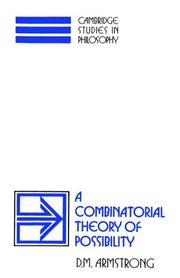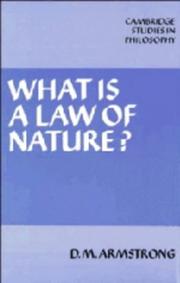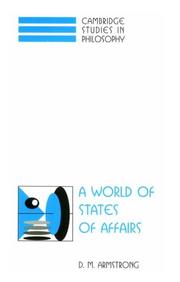| Listing 1 - 10 of 22 | << page >> |
Sort by
|

ISBN: 0521838320 0521547237 1107162130 0511215584 0511217374 0511315953 051148755X 1280541156 0511212003 0511213778 9780521838320 9780521547239 9780511212000 9780511213779 9780511215582 9780511217371 9780511487552 9786610541157 6610541159 Year: 2004 Volume: *29 Publisher: Cambridge, U.K. New York Cambridge University Press
Abstract | Keywords | Export | Availability | Bookmark
 Loading...
Loading...Choose an application
- Reference Manager
- EndNote
- RefWorks (Direct export to RefWorks)
Truths are determined not by what we believe, but by the way the world is. Or so realists about truth believe. Philosophers call such theories correspondence theories of truth. Truthmaking theory, which now has many adherents among contemporary philosophers, is a recent development of a realist theory of truth, and in this book, first published in 2004, D. M. Armstrong offers the first full-length study of this theory. He examines its applications to different sorts of truth, including contingent truths, modal truths, truths about the past and the future, and mathematical truths. In a clear, even-handed and non-technical discussion he makes a compelling case for truthmaking and its importance in philosophy. His book marks a significant contribution to the debate and will be of interest to a wide range of readers working in analytical philosophy.
Truth. --- Realism. --- #A0505W --- Realism --- Truth --- Conviction --- Belief and doubt --- Philosophy --- Skepticism --- Certainty --- Necessity (Philosophy) --- Pragmatism --- Empiricism --- Universals (Philosophy) --- Conceptualism --- Dualism --- Idealism --- Materialism --- Nominalism --- Positivism --- Rationalism --- Arts and Humanities

ISBN: 0521377803 0521374278 1139172220 9780521377805 9780521374279 Year: 1989 Publisher: Cambridge : Cambridge University Press,
Abstract | Keywords | Export | Availability | Bookmark
 Loading...
Loading...Choose an application
- Reference Manager
- EndNote
- RefWorks (Direct export to RefWorks)
David Armstrong's book is a contribution to the philosophical discussion about possible worlds. Taking Wittgenstein's Tractatus as his point of departure, Professor Armstrong argues that nonactual possibilities and possible worlds are recombinations of actually existing elements, and as such are useful fictions. There is an extended criticism of the alternative-possible-worlds approach championed by the American philosopher David Lewis. This major work will be read with interest by a wide range of philosophers.
Possibility. --- Logical atomism. --- Logical atomism --- Possibility --- Logic --- Philosophy --- Atomism (Logic) --- Arts and Humanities

ISBN: 0521253438 052131481X 1139171704 9780521253437 9780521314817 9781139171700 Year: 1984 Publisher: Cambridge : Cambridge University Press,
Abstract | Keywords | Export | Availability | Bookmark
 Loading...
Loading...Choose an application
- Reference Manager
- EndNote
- RefWorks (Direct export to RefWorks)
This is a study of a crucial and controversial topic in metaphysics and the philosophy of science: the status of the laws of nature. D. M. Armstrong works out clearly and in comprehensive detail a largely original view that laws are relations between properties or universals. The theory is continuous with the views on universals and more generally with the scientific realism that Professor Armstrong has advanced in earlier publications. He begins here by mounting an attack on the orthodox and sceptical view deriving from Hume that laws assert no more than a regularity of coincidence between instances of properties. In doing so he presents what may become the definitive statement of the case against this position. Professor Armstrong then goes on to establish his own theory in a systematic manner defending it against the most likely objections, and extending both it and the related theory of universals to cover functional and statistical laws. This treatment of the subject is refreshingly concise and vivid: it will both stimulate vigorous professional debate and make an excellent student text.
Natural law --- Philosophy of nature --- Law --- Philosophy --- Law (Philosophy). --- Philosophy of nature. --- Universals (Philosophy) --- Individuation (Philosophy) --- Universaux --- Individu (Philosophie) --- Philosophie de la nature --- Law (Philosophy) --- Nature --- Nature, Philosophy of --- Natural theology --- #GROL:SEMI-130.2:6 --- Arts and Humanities --- Law - Philosophy

ISBN: 0521589487 9780521589482 9780521580649 0521580641 9780511583308 0511583303 0511002041 Year: 1997 Publisher: Cambridge Cambridge University Press
Abstract | Keywords | Export | Availability | Bookmark
 Loading...
Loading...Choose an application
- Reference Manager
- EndNote
- RefWorks (Direct export to RefWorks)
Metaphysics. --- Metaphysics --- Métaphysique --- God --- Ontology --- Philosophy --- Philosophy of mind --- Arts and Humanities
Book
ISBN: 0710036035 9780710036032 Year: 1970 Publisher: London Routledge and Kegan
Abstract | Keywords | Export | Availability | Bookmark
 Loading...
Loading...Choose an application
- Reference Manager
- EndNote
- RefWorks (Direct export to RefWorks)
Book
ISBN: 1134856350 1280058331 9786610058334 0203003233 9780203003237 9781134856305 9781134856343 9781134856350 9781138168046 9780415100311 1134856342 Year: 2003 Publisher: London New York Routledge
Abstract | Keywords | Export | Availability | Bookmark
 Loading...
Loading...Choose an application
- Reference Manager
- EndNote
- RefWorks (Direct export to RefWorks)
Breaking new ground in the debate about the relation of mind and body, David Armstrong's classic text - first published in 1968 - remains the most compelling and comprehensive statement of the view that the mind is material or physical.In the preface to this new edition, the author reflects on the book's impact and considers it in the light of subsequent developments. He also provides a bibliography of all the key writings to have appeared in the materialist debate.
Mind and body. --- Body and mind --- Body and soul (Philosophy) --- Human body --- Mind --- Mind-body connection --- Mind-body relations --- Mind-cure --- Somatopsychics --- Brain --- Dualism --- Philosophical anthropology --- Holistic medicine --- Mental healing --- Parousia (Philosophy) --- Phrenology --- Psychophysiology --- Self --- Psychological aspects
Book
ISBN: 1316560457 1316499030 1316557723 1107142318 1316507092 Year: 2016 Publisher: Cambridge, England : Cambridge University Press,
Abstract | Keywords | Export | Availability | Bookmark
 Loading...
Loading...Choose an application
- Reference Manager
- EndNote
- RefWorks (Direct export to RefWorks)
First published in 1985, D. M. Armstrong's original work on what laws of nature are has continued to be influential in the areas of metaphysics and philosophy of science. Presenting a definitive attack on the sceptical Humean view, that laws are no more than a regularity of coincidence between stances of properties, Armstrong establishes his own theory and defends it concisely and systematically against objections. Presented in a fresh twenty-first-century series livery, and including a specially commissioned preface written by Marc Lange, illuminating its continuing importance and relevance to philosophical enquiry, this influential work is available for a new generation of readers.
Philosophy of nature --- Law (Philosophical concept) --- Speculative Philosophy --- Philosophy --- Philosophy & Religion --- Law (Philosophy) --- Nature --- Nature, Philosophy of --- Natural theology --- Philosophy of nature.
Book
Year: 1967 Publisher: London Routledge and Kegan Paul
Abstract | Keywords | Export | Availability | Bookmark
 Loading...
Loading...Choose an application
- Reference Manager
- EndNote
- RefWorks (Direct export to RefWorks)
Book
Year: 1968 Publisher: London Routledge and Kegan
Abstract | Keywords | Export | Availability | Bookmark
 Loading...
Loading...Choose an application
- Reference Manager
- EndNote
- RefWorks (Direct export to RefWorks)
Book
Year: 1961 Publisher: London : Routledge & Kegan Paul,
Abstract | Keywords | Export | Availability | Bookmark
 Loading...
Loading...Choose an application
- Reference Manager
- EndNote
- RefWorks (Direct export to RefWorks)
Knowledge, Theory of --- Perception --- Théorie de la connaissance --- Perception
| Listing 1 - 10 of 22 | << page >> |
Sort by
|

 Search
Search Feedback
Feedback About UniCat
About UniCat  Help
Help News
News